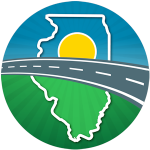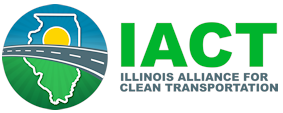Funding Resources
IACT continuously surveys available resources to support the adoption of alternative renewable fuels and technologies. Listed below is a compilation of funding opportunities to increase accessibility across diverse populations.
IACT has made a specific effort to include sources that serves various geographic areas across the state of Illinois; however, please note this page is not exhaustive. Should you see any programs omitted below, please contact us at info@il-act.org
Click HERE to download the latest IACT Grant Funding Fact Sheet.
Last updated July 1, 2025
IL EPA | Individual EV Rebate Program
The new funding round will run from October 28, 2025, to January 31, 2026.
The Illinois General Assembly has appropriated $14 million for rebates in the current fiscal year, ending June 30, 2026. Illinois residents that purchase a new or used all-electric vehicle from an Illinois licensed dealer, meet all other eligibility requirements, and apply during a rebate cycle will be eligible for a rebate. Applicants that certify as low income are given an enhanced rebate and priority in disbursement.
Rebate amounts have been updated:
- A $4,000 rebate to a low-income applicant, as defined in the EV Rebate Act, for the purchase of an all-electric vehicle that is not an electric motorcycle (See Section 2 of the Instructions).
- A $2,000 rebate to an applicant that is eligible to apply for a rebate but does not meet the low-income criteria for the purchase of an all-electric vehicle that is not an electric motorcycle.
- A $1,500 rebate to an eligible applicant for the purchase of an all-electric motorcycle.
There have been numerous changes to the program, including:
- Income limits for applicants
- Low income qualification is determined by county
- Vehicle purchase price limits
- Rebate amount
Please check the EV Rebate Program page for eligibility.
Distributed by the Illinois Environmental Protection Agency.
IDOT | NEVI Round 3
The third round of National Electric Vehicle Infrastructure (NEVI) Program is open until February 13, 2026.
This round of funding will provide up to $65 million for the construction and operation of light-duty and medium-/heavy-duty charging stations along Illinois’s public roadways, including Scenic Byways, U.S. Routes, and Interstates.
The first two rounds of the Illinois NEVI Program focused on expanding publicly accessible Direct Current Fast Charging (DCFC) infrastructure along Illinois’s Alternative Fuel Corridors (AFCs). Round 1 and Round 2, which were released in March 2024 and November 2024, respectively. Through Rounds 1 and 2, IDOT awarded $43.7 million for 62 sites that will add DCFC capacity along 13 of Illinois’s interstate routes.
Through this Round 3 NOFO, IDOT is seeking applicants to apply for grant funding available through the Illinois NEVI Program. IDOT will fund up to 80% of the defined eligible costs associated with upgrading existing EV charging stations or establishing new EV charging stations along eligible roadways across Illinois, provided that the stations meet the requirements of the NEVI Formula Program and the NEVI Final Rule. Grantees funded through this NOFO will be required to install, operate, and maintain the EV charging station throughout the term of the Grant Agreement.
IL EPA | VW Round 9 - Electric Trucks
Illinois EPA is accepting applications to fund a portion of the eligible costs associated with the replacement (not repower) of eligible existing and licensed on-road diesel Class 4-8 medium- and heavy-duty local freight trucks (at least 14,001 lbs. GVWR) and Class 8 port drayage trucks (at least 33,001 lbs. GVWR). Each new replacement truck must be of the same type and class as the retired truck and be a licensed on-road all-electric Class 4-8 medium- and heavy-duty local freight truck or Class 8 port drayage truck (hereinafter “all-electric trucks” or “electric trucks”) located and operated in any of the three VW Priority Areas established in the Beneficial Mitigation Plan.
The types of trucks covered under this NOFO are those used to haul and deliver freight or cargo, including delivery/box trucks, waste haulers, Class 8 port drayage trucks, landscape trucks, dump trucks, and freight/transport trucks. If the existing diesel truck to be replaced and the proposed new electric truck is not routinely hauling any type of freight or cargo by design or actual use, it is ineligible for this NOFO. In addition to providing funding for new all-electric trucks, Illinois EPA will also fund a portion of necessary new Level 2 or DCFC charging equipment if charging infrastructure is needed.
Applicants may find the NOFO and all application materials on the Driving a Cleaner Illinois website and also at Illinois’ GATA webpage.
Applicants must pre-qualify prior to application submission. The application period will remain open until funds are depleted. Applications should be signed, scanned and submitted to epa.vwgrants@illinois.gov
Funds available until depleted.
FHWA | Carbon Reduction Program
FHWA | Carbon Reduction Program
Distributed by the Federal Highway Administration
Funded from Oct. 1, 2021–Sept. 30, 2026
The Carbon Reduction Program provides funding to develop carbon reduction strategies and fund projects to reduce carbon emissions from on-road highway sources.
Funds can be stacked with other eligible USDOT funding for projects, if the eligibility requirements and applicable Federal share are met for each program.
FHWA | Congestion Mitigation and Air Quality Improvement
FHWA | Congestion Mitigation and Air Quality Improvement
Distributed by the Federal Highway Administration to each state
Funded from Oct. 1, 2021–Sept. 30, 2026
CMAQ funds the purchase of medium- and heavy-duty electric vehicles and EV charging infrastructure.
Projects must be located in nonattainment or maintenance areas for ozone, carbon monoxide, and/or particulate matter.
Eligible entities include state departments of transportation, local governments, and transit agencies. Non-government organizations may apply for funding if they enter into a public-private partnership with the above eligible entities.
Up to 50% of CMAQ funds can be transferred to qualified programs such as the National Highway Freight Program and the Carbon Reduction Program.
FHWA | Reduction of Truck Emissions at Ports Grant Program
FHWA | Reduction of Truck Emissions at Ports Grant Program
Distributed by the Federal Highway Administration
Funded from Oct 1, 2021–Sept 30, 2026
20% Required Match
This program provides funding to study truck idling and zero-emission alternatives at ports and for eligible entities to deploy projects in or adjacent to ports that reduce port emissions; including:
- Development of port-related infrastructure
- Usage of on-truck technologies
- Usage of low- or zero-emissions powertrains or fuels
- Reduction of congestion in or adjacent to ports
- Electrification or improvement in the efficiency of port operations
Funding will be made available each fiscal year.
EDA | Planning and Research Technical Assistance Grant Programs
Distributed by the Department of Commerce, Economic Development Administration (EDA)
Applications are accepted on an ongoing basis.
Applications are submitted through EDA's Economic Development Grants Experience Portal.
The Research and National Technical Assistance Grant supports research and technical assistance projects, including workforce development and technical assistance relative to EVs.
The Planning and Local Technical Assistance Grant Program serves to support recipients with short-term and state-planning investments designed to guide the eventual creation and retention of high-quality jobs. This funding can be used for EV technical assistance, infrastructure planning, and workforce development. To view the regional offices, Notice of Funding Opportunity (NOFO) number, and states served, please visit the website.
USDA | Community Facilities Direct Grant Program
USDA | Community Facilities Direct Grant Program
Distributed by the Department of Agriculture, Rural Development
Application window is open year-round.
As part of the Community Facilities Direct Loan and Grant Programs, the Community Facilities Grant Program provides additional funding, along with that for vehicle acquisition for communities in rural areas.
Eligible borrowers include public bodies, community-based non-profit organizations, and federally-recognized tribes in cities, villages, townships, and towns with no more than 20,000 residents according to the latest U.S. Census Data.
ComEd Rebates | For Business and Residential
ComEd Business Customer EV Rebates
Business and public sector customers may qualify to get a rebate for upgrading vehicles to electric.
- Fleet Vehicles, Class 1-2 (Light duty) rebates
- Base rebate: $5,000
- Select Customers Rebate*: $7,500
- Fleet Vehicles, Class 3-6 EV (Medium duty) rebates
- Base rebate: $20,000
- Select Customers Rebate*: $30,000
- Fleet Vehicles, Class 7-8 EV (Heavy duty) rebates
- Base rebate: $50,000
- Select Customers Rebate*: $75,000
- Transit Bus >=30’ rebates
- Base rebate: $80,000
- Select Customers Rebate*: $120,000
- K-12 School Bus >=35’ rebates
- Base rebate: $120,000
- Select Customers Rebate*: $180,000
ComEd is working to establish a process to enable pre-approved rebate vouchers that can be applied at the point of purchase for new vehicles and a post purchase solution for pre-owned vehicles.
ComEd Business Customer Make-Ready Rebates
Business and public sector customers can also receive rebates on make-ready infrastructure, whether located on the customer side or ComEd side of the meter for Level 2 (“L2”) and Direct Current Fast Chargers (“DCFC” or Level 3).
- Make-Ready Rebates for infrastructure serving Level 2 (L2) Charger
- Base Rebate: Make-ready rebate of up to $5,333 per port with a 10-port maximum
- Select Customers* Rebate: Make-ready rebate of up to $8,000 per port with a 10-port maximum
- Make-Ready Rebates for infrastructure serving Direct Current Fast Chargers (DCFCs or Level 3 chargers)
- Base Rebate: Make-ready rebate of up to $667 per kW with a minimum of 50 kW (maximum rebate of $500,000)
- Select Customers* Rebate: Make-ready rebate of up to $1,000 per kW, with a minimum of 50 kW (maximum rebate of $500,000)
Learn more about Make-Ready Infrastructure here.
ComEd Rebates | Residential
The program offers rebates for the installation and purchase of Level 2 (L2) electric vehicle (EV) chargers that are "smart" (i.e. Wi-Fi enabled), ENERGY STAR® certified, and Nationally Recognized Testing Laboratory (NRTL) certified to Residential ComEd Customers. Charger installation must be completed before submission of a Program application.
The base rebate is up to $2,500, for Select Customers the rebate is up to $3,750. See the program terms and conditions for more information on eligibility for the higher rebate.
Illinois Propane Gas Association | Propane Vehicle Incentives
Incentives are available to Illinois propane customers who purchase a new propane vehicle. Any propane vehicle that is registered and operated in the state of Illinois is eligible for up to $4,000 for the purchase of a new propane vehicle or cost of the conversion if less than $4,000.
All rebate and incentive applications must be submitted by your Illinois propane provider to qualify. If you have purchased a new propane vehicle or converted a vehicle to propane, contact your propane provider to apply. View the Rebate Guidelines for more information.
Learn more on the Illinois Propane Gas Association website.
Federal and State Incentives
The U.S. Department of Energy’s Alternative Fuels & Advance Vehicles Data Center is your source to finding the federal and state incentives and laws surrounding air quality, fuel efficiency, and alternative fuels and advanced transportation technologies.
*New and used EV federal tax credits will not be available after September 30, 2025.*
BECOME A MEMBER
IACT, formerly known as Chicago Area Clean Cities, is a voluntary, locally based coalition dedicated to reducing emissions from the transportation sector.


